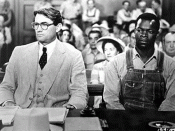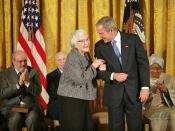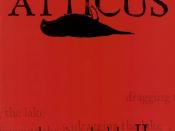The forces that shape Scout and Jem's growth and development.
Harper Lee's critically acclaimed literary masterpiece, To Kill a Mockingbird, set in post-depression Southern America, tells the compelling story of how two men, "Boo"� Arthur Radley and Tom Robinson (the real mockingbirds) came to be horribly victimised by a sexist and class-orientated society. "Maycomb was an old town, but it was a tired old tired town when I first knew it."� (Page 5) What induced this former tiredness? A rigid and time-honoured "ÃÂChristianity;' a code so severe that whoever breaks it is hounded from Maycomb's midst as unfit to live with: Do unto others as you would have them do unto you"æunless they're black. Indeed, Maycomb has it's fair share of racists and its two children, Scout (Jean Louise) and Jem (Jeremy) Finch, go to hell and back to accept this "" accept the conscience of a town steeped in prejudice, violence and hypocrisy; accept that a white girl's reputation was deemed more important than a black man's life in a trial that changed them forever.
Together they learn from Maycomb's mistakes... But there are greater forces that shape Scout and Jem as they grow up; Forces who foster mental, emotional and moral development and lead them to understand that the majority can't always dictate matters of conscience.
The epitome of moral character, Atticus teaches his children (as well as his community) how to stand up for one's beliefs in the faced of prejudice and ignorance by defending a black man, Tom Robinson, wrongfully accused of raping a white woman, Mayella Ewell. He exemplifies moral courage although he knows he has not got a chance in hell"æor Maycomb rather. Having lost his wife when Scout was just two years old, Atticus devotes himself to his children despite criticism from family and neighbours who think his children lack discipline and proper guidance. Thus, in many instances, Atticus' "ÃÂrenegade-Finch' persona rubs off on Scout, more so when she realises that there are fixed ideas about how females in the South should look and behave. Scout doesn't want to conform to the stereotype, and rejects Aunt Alexandra's opinion that she should wear dresses and feminine trinkets and play house. Atticus' maxim is based upon his unswerving belief that there is a good side to every human being "" even in Maycomb. Despite their callous indifference to racial inequality, Atticus sees much to admire in them. He recognises that people have both good and bad qualities, and he is determined to admire the good while understanding and forgiving the bad: "Atticus said I had learned many things today, and Miss Caroline had learned several things herself. She had learned not to not to hand something to a Cunningham for one thing, but if Walter and I had put ourselves in her shoes we'd have seen it was an honest mistake on her part. We could not expect her to learn all of Maycomb's ways in one day, and we could not hold her responsible when she knew no better."� (Page 33) Scout later puts her newfound knowledge of empathy into practice by trying to understand Jem's moodiness and "ÃÂclimbing into his skin' in chapter seven- she is growing as a result of Atticus' pedagogy. Atticus also teaches Scout that sometime compromise is more beneficial than strict adherence to the law. (As in the case of the Ewell children and the Haverfords.) Throughout the novel, Jem is forever evolving his understanding of justice and his understanding of the way things should work. And it takes forever, because in Maycomb, justice does not always prevail in the context of the law. He tested the event and its consequences against his father's word and then developed his own understanding of the way things should be. In like fashion to Atticus, he consulted his conscience before acting upon it, and told Scout not to beat up Walter because ""æyou're bigger'n he is."� (Page 25) He knows that Atticus has told Scout not to fight. And through their father, the Finch children grow from a lack of understanding to a consideration of others.
In all, Atticus Finch suggests that persons of good will in whom love and generous loyalty supersede law, and others in whom meanness "" along with envy and fear "" breeds lying persecution, under law.
A cancer sufferer, Mrs Dubose exemplified true courage. True courage is defined as possessing the determination to do something regardless of benefit. It is morally sticking to one's conscience. Mrs Dubose asked that Jem to read to her daily so she could overcome her narcotic dependence. "'She'd have spent the rest of her life on it and died without so much agony, but she was too contrary-"ÃÂ"� (Page 123) Instead, she put herself through pain because "she said she was going to leave this world beholden to nothing and nobody."� (Page 123) Courage has its many different forms, and Mrs Dubose's bravery in enduring her pain so that she can face death with independence and self-respect is a truer example of courage than a man with a gun in his hand.
Miss Maudie is the androgynous figure Scout aspires to. "She was a widow, a chameleon lady who worked in her flower beds in an old straw hat and men's coveralls, but after her five o-clock bath she would appear on her porch and reign over the street in magisterial beauty."� (Page 47) The more time she spends with her, the more she perceives her to be a real lady, a role model. She admires her purely for the fact that Maycomb respects her for who she is - that is, a counterpoint of Aunt Alexandra. ""æJem and I had considerable faith in Miss Maudie. She had never told on us, had never played cat and mouse with us, she was not at all interested in our private lives. She was our friend."� (page 49) Unlike her contemporaries, Miss Maudie Atkinson minds her own business and behaves without pretension or hypocrisy. She is sympathetic towards Boo because she he is the victim of his father's religious bigotry. "Arthur Radley just stays in the house, that's all"æwouldn't you want to stay in the house if you didn't want to come out?"� (Page 48) Here, she provides reasoning and quells the Maycombian rumours. She teaches the children to be humane and talks of him s if he is a real person and Scout is almost surprised about this. When the children found twine, soap carvings of two figures, more chewing gum, a medal and watch in the peephole outside the Radley Place, Jem wrote a thank you letter to put in the tree. His decision to thank the mysterious donor shows his sensitivity and his awareness of the other person "" a virtue courtesy of Miss Maudie Atkinson.
o Jem grows to understand Nathan Radley's oppression and begins to feel sorry for Maycomb's "ÃÂgrey ghost.' Jem realises that Nathan blocked the hole to cut off communication with the children. He is moved to tears when he discovers that he has deliberately prevented Boo from showing friendship to the children - "Boo's children."� (Page 308) Jem knows that Boo is not dangerous, but kind and thoughtful towards them. "There wasn't much left for us to learn"ænothing's real scary except in books."� (307-308) Both Scout and Jem had grown from fearing Boo Radley to protecting him. Dolphus Raymond teaches them that sometimes, you have to live a lie to be accepted in Maycomb: "I'm not much of a drinker, but you see, they could never, never understand like I do because that's the way I want to live."� (Page 221) This can be applied to Mayella Ewell. She merely broke a rigid and time-honoured code of Maycombian society - she tempted a black man. She accused him of raping her - she lied, because she was afraid of being hounded by society as unfit to live with. Atticus teaches his children never to lie, especially at the expense of another man's life. He says "ÃÂhave Mrs Dubose's courage, Miss Maudie Atkinson's sympathy and my honesty, to be true to yourself and your conscience.' This, in many ways, remains the universal message of the entire book.





